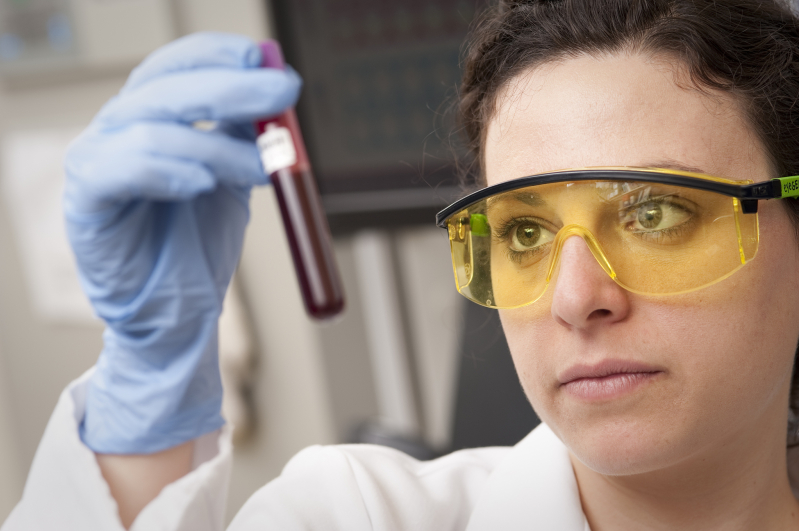
Two new studies published on Wednesday of patients with breast and prostate cancers add to growing evidence that detecting bits of cancer DNA circulating in the blood can guide patient treatment.
Enthusiasm is building for "liquid biopsies," which offer a non-invasive alternative to standard tissue biopsies and are expected to be a multibillion-dollar market.
But a key question remains: Do they really work? The stakes are high. At least 38 companies are working on liquid biopsies for cancer, according to analysts at investment bank PiperJaffray, who think the U.S. market alone could eventually reach $29 billion a year.
Analysts at financial services firms Cowen & Co and Leerink Partners Llc estimate the potential at $10 billion within the next decade or so. Public companies in the field include Roche-backed Foundation Medicine Inc , Qiagen NV , Genomic Health Inc , Myriad Genetics Inc , Illumina Inc, Sequenom Inc and Trovagene Inc. Private players include Guardant Health Inc, Personal Genome Diagnostics Inc, Adaptive Biotechnologies, Exosome Diagnostics Inc and Pathway Genomics Corp.
"If it works, it is fantastic," said Severin Schwan, chief executive of Roche Holding AG, the world's biggest diagnostic company. "The question is, does it really work and does it work for all cancers?"
It is a concern shared by genome pioneer Craig Venter, whose company, Human Longevity Inc, has a partnership with Personal Genome Diagnostics.
"It's like everybody has accepted this as a fait accompli. Like it's real and it means something. But it hasn't been proven."
The hope is that liquid biopsies could be used as a simple way to sample tumor DNA in the blood to see if patients are responding to treatment, check for mutations or drug resistance, or see if cancer has returned. Eventually, they could be used to screen healthy patients. But many more studies are needed first.
With a liquid biopsy, doctors could know immediately when a cancer starts changing and could adapt therapy to suit."Theoretically, it is extremely compelling," Schwan said. "Today, we typically change therapy when the cancer progresses or grows - but we know the mutations occur much, much earlier."
LONGER LIFE?
Dr. Nick Turner of Britain's Institute of Cancer Research said the technology had huge potential but more evidence was still needed. "What is really missing at the moment is the hard evidence that using liquid biopsy and treating patients on that basis improves hard endpoints like how long the patient lives. The field really needs those studies to change practice," he said. Still, small steps are being taken. In January, for example, Qiagen NV launched a liquid biopsy in lung cancer as a companion diagnostic for drugs that target a cancer growth factor known as EGFR in cases when a tissue sample is not available. And the scientific evidence is building.
In a study on Wednesday in the journal Science Translational Medicine, researchers using liquid biopsies in 97 men with prostate cancer found genetic mutations that may be driving drug resistance in those who fail to respond to conventional therapy.
The work by scientists at Italy's University of Trento suggests liquid biopsies could be used to guide treatment. A second study in the journal Nature Communications tracked a single woman with metastatic breast cancer over three years and, by comparing tissue and liquid biopsies, found that blood tests accurately reflected genetic changes in her tumors over time. Dr. Keith Stewart, an oncologist who heads Mayo Clinic's Center for Individualized Medicine, believes liquid biopsies are the future, but it may take three to five years to fully understand how useful they will be. "I'm very confident liquid biopsies will become a routine part of clinical practice in cancer," he said.
What is missing is data showing that early intervention based on liquid biopsies actually affects outcomes - but there are more and more hints. Dr. David Hyman of Memorial Sloan Kettering Cancer Center in New York is presenting results this weekend from a study showing that patients whose tumor DNA in the blood fell by 50 percent or more 21 days into therapy fared much better than others. Hyman agrees more testing should be done, looking at how consistently the tests perform and how much they help patients. "The only way to do that is to bring these technologies forward and to test them in the clinic, often in the context of pivotal clinical trials, to demonstrate that these technologies have value. I think we're on the cusp of doing that," he said.





![[Exclusive Interview] A revelation within the brink of life and death — Meg Leung’s mission in Christian art](https://www.gospelherald.com/media/cache/thumbnail/7/21/72163sp_273w_150h_1x_1y.jpg)

